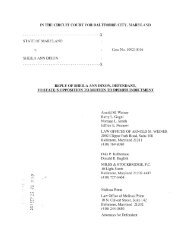Memorandum Opinion - the Circuit Court for Baltimore City
Memorandum Opinion - the Circuit Court for Baltimore City
Memorandum Opinion - the Circuit Court for Baltimore City
Create successful ePaper yourself
Turn your PDF publications into a flip-book with our unique Google optimized e-Paper software.
no specific jurisdiction because plaintiff could not show an agency relationship between <strong>the</strong>moving defendants, who had developed and marketed interactive software, and <strong>the</strong> defendantlicensees, who had used <strong>the</strong> software to <strong>the</strong> plaintiff’s detriment.In MaryCLE, <strong>the</strong> <strong>Court</strong> found that Maryland had personal jurisdiction over a nonresidentdefendant based on its internet contacts with Maryland, namely 83 unsolicited, false,and misleading emails sent to plaintiff in violation of Maryland Commercial Electronic MailAct (“MCEMA”), Com. Law. Art. § 14-3001, et seq. 19 In deciding that Maryland couldconstitutionally assert jurisdiction over First Choice <strong>for</strong> sending <strong>the</strong> unsolicited emails, <strong>the</strong><strong>Court</strong> noted that “[a]lthough First Choice did not deliberately select Maryland or any o<strong>the</strong>rstate in particular as its target, it knew that <strong>the</strong> solicitation would go to Maryland residents.”Id.In MaryCLE and <strong>the</strong> three cases it relied upon, 20 <strong>the</strong> defendants had sent unsolicited19MCEMA was passed to “curb <strong>the</strong> dissemination of false or misleading in<strong>for</strong>mation throughunsolicited, commercial e-mail, as a deceptive business practice.” Id. at 496, quoting BeyondSystems,388 Md. at 16.20One of <strong>the</strong> cases Fenn v. MLeads Enters., Inc.,103 P.3d 156, 164 (Utah Ct. App. 2004) wasreversed shortly after MaryCLE was decided. 137 P.3d 706 (Utah 2006). In Fenn <strong>the</strong> complaint hadbeen filed under Utah’s Unsolicited Commercial and Sexually Explicit Email Act, which required<strong>the</strong> characters "ADV" in <strong>the</strong> subject line of unsolicited commercial email. Id. at 709. One monthafter <strong>the</strong> complaint in Fenn was filed, Utah repealed <strong>the</strong> Act because <strong>the</strong> legislature concluded that<strong>the</strong> federal “Controlling <strong>the</strong> Assault of Non-solicited Pornography and Marketing Act” 15 U.S.C.§ 7701 (2005) preempted it. Id. The <strong>Court</strong> held that asserting jurisdiction violated due processbecause one unsolicited email was not sufficient minimum contact and imposes a substantial burdenon corporations to know <strong>the</strong> law of 50 states. Id. at 715-16.In Internet Doorways v. Parks, 138 F. Supp. 2d 773, 774 (S.D. Miss. 2001) <strong>the</strong> plaintiffasserted claims <strong>for</strong> violations of <strong>the</strong> Lanham Act, 15 U.S.C. § 1125, a federal law prohibiting falseor misleading representations of fact relating to commerce, and <strong>the</strong> state law tort of trespass tochattels. The defendant sent an unsolicited email to people "all over <strong>the</strong> world, including Mississippiresidents, advertising a pornographic web-site" in an attempt to solicit business. The <strong>Court</strong> noted:By sending an e-mail solicitation to <strong>the</strong> far reaches of <strong>the</strong> earth <strong>for</strong> pecuniary gain,one does so at her own peril, and cannot <strong>the</strong>n claim that it is not reasonably24
















